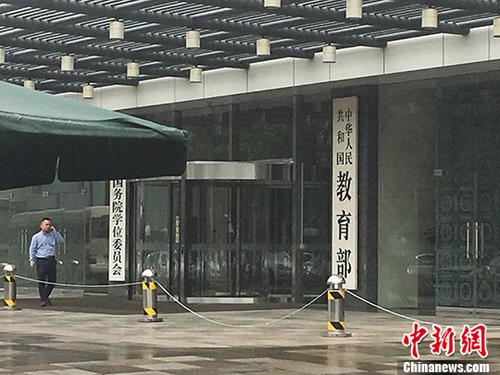China News Service, January 7th. According to the website of the Ministry of Education, the Ministry of Education recently issued the "Measures for the Sampling of Undergraduate Thesis (Design) (Trial)" (hereinafter referred to as the "Measures"), which will be implemented on January 1, 2021.
The "Methods" proposes that the sampling of undergraduate graduation thesis shall be conducted once a year, and the objects of sampling shall be the thesis awarded for bachelor's degree in the previous academic year. In principle, the sampling rate should not be less than 2%.
Data map: Ministry of Education.
Photo by Fu Yu
The "Measures" proposed that the Ministry of Education is responsible for the overall organization and supervision of the sampling of undergraduate thesis, and the provincial education administrative department is responsible for the specific implementation of the sampling of undergraduate thesis in the region.
Among them, the relevant departments of the Chinese People's Liberation Army are responsible for the specific implementation of the random inspection of undergraduate thesis in the military system.
Among them, the undergraduate graduation thesis sampling is carried out once a year, and the sampling objects are the thesis awarded with bachelor degree in the previous academic year, and the sampling rate should not be less than 2% in principle.
In terms of working procedures, the "Measures" pointed out that the Ministry of Education has established a national undergraduate thesis sampling information platform (hereinafter referred to as the sampling information platform) to provide provincial education administrative departments with customized functions such as academic misconduct detection, graduation thesis extraction, and expert review. Supervise the whole process of undergraduate thesis random inspections carried out by the provincial education administrative departments.
The provincial education administrative department adopts a random selection method to determine the sampling list based on the sampling information platform and the bachelor's degree award information in the region.
Sampling papers should cover all undergraduate-level universities and all undergraduate majors in the region.
The provincial education administrative department uses the random inspection information platform to conduct academic misconduct inspections on the randomized papers, and the inspection results are for expert review and reference.
The provincial education administrative department adopts a random matching method to organize peer experts to review random papers and put forward comments.
Each dissertation is sent to 3 peer experts. Among the 3 experts, 2 or more (including 2) of the experts will review the dissertation as "unqualified" and will be identified as "problem dissertation".
Among the 3 experts, 1 expert commented as "unqualified" and will be sent to 2 peer experts for re-evaluation.
Among the two re-evaluation experts, more than one (including one) expert commented as "unqualified" and will be identified as "problematic graduation thesis".
The "Methods" proposes that in terms of the use of the results of the sampling of undergraduate thesis, (1) The results of the sampling shall be disclosed to the public in an appropriate manner.
(2) For colleges and universities that have "problematic graduation thesis" for two consecutive years, and the proportion is high or the number of papers is large, the provincial education administrative department should notify within the province, reduce its enrollment plan, and conduct quality interviews , Put forward a deadline for rectification requirements.
Universities should investigate the implementation of the personnel training responsibilities of relevant departments, colleges and individuals, and hold them accountable in accordance with relevant regulations.
(3) For undergraduate majors that have many problems in random inspections for three consecutive years, those who fail to meet the requirements after rectification are deemed to be unable to guarantee the quality of training, and the provincial education administrative department should order them to suspend enrollment in accordance with relevant regulations, or have a provincial degree The committee revoked its bachelor degree authorization point.
(4) For graduation thesis suspected of plagiarism, plagiarism, forgery, tampering, buying and selling, writing on behalf of other academic misconduct, colleges and universities shall investigate and verify in accordance with relevant procedures, and if verified, the degree granted shall be revoked according to law and the degree certificate shall be cancelled. .
(5) The results of random inspections will serve as an important reference for the allocation of educational resources such as undergraduate education and teaching evaluation, first-class undergraduate professional construction, undergraduate professional certification, and professional construction funding.
The Ministry of Education is responsible for the interpretation of the "Measures" and will come into force on January 1, 2021.

